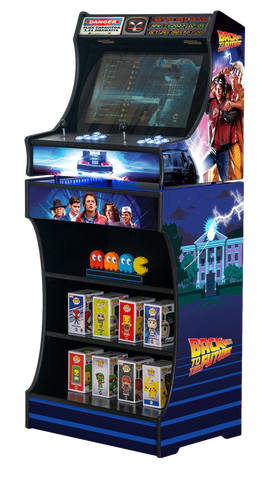A key component in learning about effective game design is psychology. Decades of practice have gone into making games, considering so many factors to create something that is entertaining and well-accepted. Arcade games that emerged in the 1970s captured the hearts of millions around the world. Gamers felt they had entered fascinating new worlds thanks to this unique gaming experience.
The entire credit for this kind of engagement goes to the game developers who have a vast knowledge of psychology in arcade game design. Modern game design involves many moving components, and rightly so. But what are the contributing factors to arcade game design? How did those games become such hits? Let’s find out!
What Does Arcade Game Mean?
Arcade games are coin-operated video games that you may find in public spaces like restaurants, shopping centres, and amusement arcades. Video games, pinball machines, and electromechanical games are the typical types of arcade games. Arcade games reached their peak in the late 1970s and early 1980s. They were well-liked even in the early nineties. Yet, as console and PC games gained popularity, this platform's popularity decreased slightly. But, with the improved technology, arcade games are returning in new forms.
The History of Arcade Games and Their Popularity
Like the commercial foosball table and the Imperial shuffleboard, arcade games have been around for decades and are still very popular. The 1970s saw the creation of Computer Space, the first arcade game. Arcade games didn't gain widespread popularity until Pong's release in 1972. Since then, some of the greatest arcade games have come and gone over the years. These games, including Dance Dance Revolution, Street Fighter II, and Pac-Man, kept gamers engaged for hours.
The best arcade games promoted the development of strategic thinking and hand-eye coordination. The development of arcade games from basic electronic devices to complex devices capable of creating engaging experiences is evident in their history. Now, modern technologies allow you to play vintage arcade games on your PCs or phones. There’s always something incredibly enjoyable while in the arcade cabinet!

Arcade Game Characteristics
There are several qualities that identify arcade games, most of which are present in every arcade video game or machine.
-
Intuitive Controls
An arcade game is easy enough for a newbie to learn how to play. These are not age-specific games. So, anyone can play them.
-
Short Levels
The purpose of every session is to make the play short and engaging enough for the player to want to return.
-
High Scores
In a given game, the player's best score serves as a gauge of his skill. When a game ends, you can sign your name next to the score you received. If you placed in the top 10, your score would go into a leaderboard table until someone beats you.
-
Increasing Difficulty
Most arcade games don't have an endpoint. The game is relatively easy to start but gets more complex as you go. Players might now challenge themselves to beat other players' scores or their own.
-
Lives
The player begins with multiple single-use attempts (lives) to develop his gaming skills and beat his previous score.
The Psychology in Arcade Game Design
The involvement of psychology in arcade games aims to capture players’ minds and keep them interested. The games hook the players with challenges; also, ending a level gives some rewards as well. These techniques help developers create entertaining and fascinating games.
-
Quick to Master
It's a clever method known as quick-to-master that arcade game designers employ to guarantee you have a great time playing their games. They essentially make games incredibly simple to pick up and play quickly.
They want you to enjoy yourself and feel like a champion, not frustrate you. Give the designers of the arcade game a mental high five the next time you jump in and swiftly pick things up.
-
The Reward System and Instant Gratification
Playing arcade games is all about getting instant fun. They have a neat system that pays you for continuing to play. Your brain releases dopamine, a feel-good neurotransmitter, when you accomplish a task or complete a level. It gives your brain peace and leaves you feeling incredibly content. Your desire to play increases as a result of this joy.
Because they provide immediate, lucid feedback, arcade games have a magical quality that inspires players to keep trying to improve and earn additional rewards. Given how much fun they are, it should come as no surprise that arcade games may become highly addictive.
-
The Role of Challenge
The type of difficulty that arcade games offer is another crucial component. The goal of arcade games is to be challenging enough to keep players interested without being annoying. The right amount of difficulty is essential to maintaining players' motivation and engagement. It gives them a sense of satisfaction and success when they conquer the task.
There are many other ways to approach this problem. Timing-based tasks like shooting a moving target within a limited time or skill-based tasks like figuring out a tricky maze are fascinating features. The idea is to give players a sense of growth and achievement. It makes players feel like they are improving and getting farther with every try.
-
The Role of Social Interaction
The opportunity for social engagement that arcade games offer is another important perspective. Players compete with one another in games to see who can get the most significant score. They try to beat one another and showcase their skills. The competition may get savage and inspiring. But the bond between the players remains intact. Players can be motivated to keep playing and improve their gaming and social skills with such engagement.
-
Escapism and Psychological Rewards
Arcade games provide a quick break from everyday worries and anxieties. Games are a fantastic way to pass the time and reduce tension. Playing arcade games can give the players a sense of accomplishment and also peace of mind.
-
Risk of Addiction
Arcade games can be fun, but it's essential to be aware of the possibility of addiction. The reward structure influences a gamer to play more. The signs of addiction include fascinating gaming and losing control over gaming habits. Individuals and gaming groups can encourage how much time a person should play the game. These groups can also present the impact of continuous gaming using social media.

The Future of Arcade Gaming and Its Impact on Society
Game designers are searching for the newest and best gaming technology for players of all sectors and ages. The future of arcade gaming appears bright with recent developments. The options for improvement are unlimited; think about virtual reality headsets that can take you to another universe!
Many of the greatest arcade games ever made are still popular. Classic games like Pac-Man, Space Invaders, and Donkey Kong still allure us with their addicting gameplay that has survived over time. Dancing machines and racing simulators are crowd pleasers, ensuring everyone can have fun at family gatherings or at amusement centres.
Many people think traditional arcades will survive as a social hub for gamers. Home consoles and internet gaming have undoubtedly impacted our choices. Still, you can expect even more thrilling experiences from your beloved old and brand-new games at times.
We are eager to see what the future holds for the arcade gaming industry because we are passionate gamers. Gaming will always be a thrilling pastime that draws people together, no matter whether we play it at home or in an arcade.
Conclusion
Arcade games are more than simply buttons and pixels if we think from a broader perspective of psychology in game design. These games are a psychological playground with the excitement of competition. They're constructed with experiences that appeal to the gamers’ thoughts and feelings. So, the next time you grab a joystick, remember the complex psychology that goes into your favourite arcade game.
If you are looking for the thrill of arcades at your home or business establishment, Arcades Australia has an excellent collection available at unbelievable costs. Don’t hesitate to call us- bring the magic of arcades to your place!

